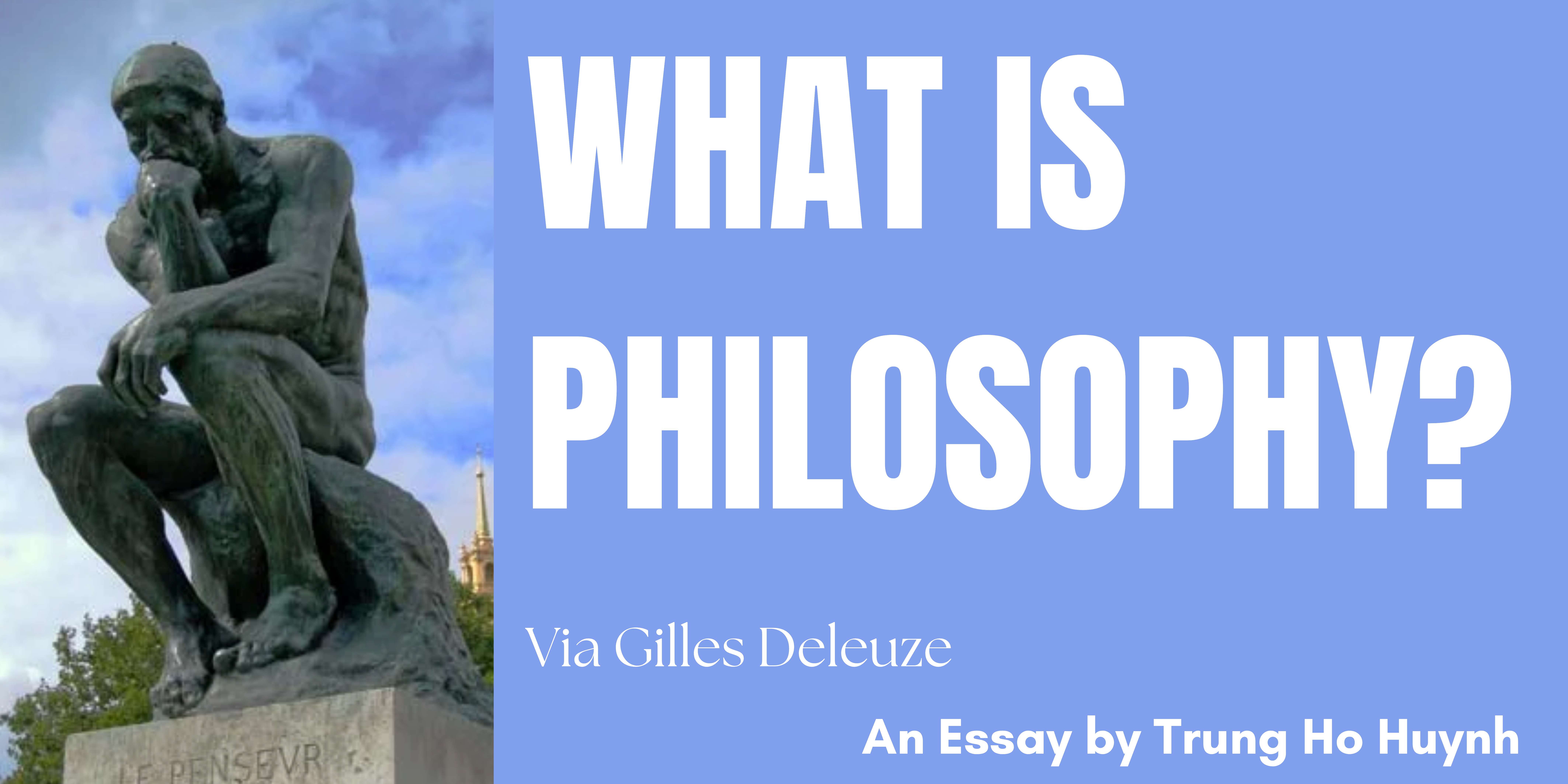Introduction:
Let’s first start with a statement: human life is suffering. Throughout history, ranging from our ancestor, the first Homo Sapien who stepped foot out of Africa to 2024’s Homo sapiens who work in offices and type at their computers, all have experienced or are still experiencing life’s pain and suffering. What causes pain and suffering? Everything: relationships, trauma, death, slavery, family and so on. And from this pain and suffering a creation was formed. A field of study that attempts to somehow solve this or at least help humans to cope with this problem in life – philosophy.
So, what is it? On the surface, philosophy can be seen as an art to form concepts about life, an invention to create a way to function well. Hereupon opens the door for humans to be able to endure this problem in life and emerge victorious. But that is still too vague. We need to dig deeper, to understand what ‘philosophy’ truly means: is it an idea a person had about life? How did it come about? How did it form? I want to know the core of philosophy: to dissect and examine each fragment of it. I will embark on this quest with the help of the late postmodernist philosopher, Gilles Deleuze, and his book, What is philosophy?
Main:
Gilles Deleuze, born 1925, was a French philosopher in the middle and late 20th century. As a postmodernist, he is famous for using the technique of deconstruction to understand or solve problems. He had covered many wide ranges of topics in the domain of philosophy, one his most famous works being The Logic of Sense in 1969, which gave the reader detailed studies of interpretations of some of the most influential philosophers (Spinoza, Kant, Humme, etc). But for the moment I will primarily use materials from his book What is Philosophy? in order to achieve a better understanding about the field.
For us to move on with the discussion more smoothly, a short definition of the concept persona is needed. The word persona is a Latin word, in its original context it means to describe masks. As we move on in history, the word persona carries different meanings. In the world of philosophy, especially in the work of Delueze, the persona can be seen as an inner compulsion of a philosophy. As a philosopher learns a philosophy, this inner compulsion (which belongs to the philosophy) will emerge itself and shatter the self-understanding of a philosopher until he surrenders his thought to it. From this, it creates a new person within the philosopher, a new entity that is separate from the “I”.
An example can be used is the fictional superhero Batman, for Batman has 2 personas: Bruce Wayne and the crime fighting character – Batman. In the daylight Bruce Wayne composes a set of characteristics of: playboy, outgoing, charming but in the night time when the same person puts on a mask, a new persona emerges with a completely different set of characteristics: scary, violent, straightforward. Two different personas live inside one body.
It Started with the Greeks:
Let us start at the time of the ancient Greeks who, certainly, were one of the first to introduce the world to this unique field of human consciousness.
The word ‘Friend’ is the key persona[1] [2] . In order to understand how the Greeks viewed philosophy, we need to know what ‘Friend’ means. Friend is the word to describe a close or intimate relationship between two subjects, which can be between humans or between human and objects. This is vital, for the Greek viewed philosophers as Friend[3] [4] of wisdom, those who seek wisdom but do not formally possess it. From here, the technique of deconstruction can be applied in order for us to look at it more closely: the phrase ‘Friends of wisdom’ – what does that mean? Is it a type of competent intimacy between wisdom and humans?
With the creation of philosophy it produced the first element of this persona Friend. The Greeks had forced philosophers to have a relationship with an Entity, an Objective or Essence[5] [6] : something that is abstract, an idea or a way. Examples of this ‘something’ can be drawn from all around the world of philosophy: the Confucius is Friend with the rite consisting of the important 5 morals ‘‘benevolence, wisdom, courage, reliability in words, reverence’[7] ’, the Stoic is Friend with the view on living life in accordance with nature. To the Greeks, to be a philosopher meant to be ‘Friend’ and establish a relationship with these Entities.
Second, to be a ‘Friend’ is to claim wisdom and compete against anyone who also wants to claim it.
To be Friends of wisdom is to lay claim to it. How can it not be that way? For all philosophical concepts are born out of thought exercises. To be the ‘Friends’ means to pursue and think and rethink about wisdom, striving for its full emergence, to care for it so much and pay the utmost attention to it, to be its only companion, the one who understands it the most. Isn’t this ‘Friend’ now turned into something of a ‘lover’?
And when you have accomplished this task, aren’t you the closest thing to this wisdom? Then, aren’t you the one who claims that you are the one who fully understands it and are in fact its ‘Friend’. To look furthermore, this relationship with wisdom will need the action of compete. For the one who lays claim to it needs to involve himself in competition against others who are also in pursuit of the same wisdom. As a ‘Lover’ he will need to protect the thing that is precious to him, for he wants to be the one who fully and truly understands it.
It is in this aspect that philosophy had its Greek element and more interestingly, this is the element that played a big part in forming their democratic society: an equal playground of friends that promoted rivalry, contest between philosophers to push each other in every aspect. It was created with a sense of sportsmanship. This is the moment and circumstance that philosophy was in at the time: to maintain a friendship with wisdom is meant to maintain a relationship with an Entity, Objective and Essence, and also the rivalry of claimants will accompany it. “Is this not too great a task?” Deleuze questioned.
The Concept of Philosophy:
Friend, Rival, Claimant – all persona that represent the Anicent’s world of philosophy had immensely impacted humanity’s way of thinking and life. However, let us move from the Ancient to something more relatable, something that is closer to us – the modern day philosophy.
Throughout the history of development of philosophical ideas. We encounter the next stage which occurred during the Enlightenment period. In this time, philosophy is a tool for thinkers to bring the power of God into the hands of humans. This is where the question of ‘How should one act?’ appeared, questioning the morality and virtue of humans in order for us to seize our own destiny. An interesting period that deserves a deeper discussion for another time.
And then from the Enlightenment came the modern time. What does the modern thinker believe is philosophy? The answer to that question is the persona ‘Concept’. An evolution that is derived from but also slowly separated from the Greeks.The ‘Friends’ of Wisdom is now replaced with Concept: the philosopher is the potential for the persona concept to emerge on.
And if you are thinking ‘Concept’ means to invent or fabricate then you are wrong. For Concept doesn’t have forms and doesn’t need to be discovered and it is certainly not a product. For modern thinkers, concepts in philosophy need the action of creation, like an artist creates his masterpiece. I will continue this explanation of ‘action of creation’ with the description[8] [9] [10] which Dr. Jordan Peterson gave in Lecture 10 belonging to his Biblical Lecture Series in 2017.
Let’s imagine there are 3 zones in human lives. The first zone can be called the ‘comfortable’ zone, this is the place we are surrounded with things that we are familiar with and it is safe and pleasant. The second zone can be called the ‘unknown land’, this is the place of chaos. It consists of things that you don’t understand, things that are painful and miserable, it is the Dante interpretation of Hell. This is what ultimately created the suffering in life, or some even go to the extent to say that it is the life of a human being. It’s scary and can destroy a human being, but it is where the challenge and the knowledge stays.
And finally the third zone which stays in the middle of zone one and two. This zone is crucial, because this is where philosophy shows its value. ‘Concept’ and also ‘Art’ are created in this third zone, this is where an artist or an philosopher goes to the unknown, the Hell, the suffering, and brings the knowledge back and creates a set of patterns (a painting, a concept, a song, etc.) in order to attempt to understand and conquer the suffering in life. It is a window to transcendence, it speaks to you and represents an idea that can change you. It is the mythology story of the phoenix rising up from the ash. This is the meaning of ‘Concept’. This is the value that philosophy brought to our life, that brings chaos to order.
And all of the creations from this third zone are singular. And each concept of philosophy is specifically designed from a specific and distinct philosopher, differentiated by their signature next to the concept.
Characteristics of Modern Philosophy
To wonder, to understand yourself, to know how to think, how to act – these are the characteristics of philosophy that seduce a person. However, it is hard for anyone to truly define what precise characteristics philosophy has.
That is to say, Deleuze thought that in order to understand it you must first try to create it yourself, for you will know nothing if you don’t try. Construct concepts of philosophy in the scenario that is specific to them, and allow it to have the freedom to create.
Contemplation, reflection, or communication. These are the 3 things that Philosophy is not. Let’s first talk about contemplation: the act of thinking about something for a long time. Philosophy is not this, for contemplation is the creation of already existing concepts.
Philosophy is not reflection because no one ever needs any idea from philosophy to reflect on anything. No human being needs the use of philosophy to reflect on whether they live a good life or not. Philosophy doesn’t find its shelter either in communication, as for a conversation between people containing opinions to create a consensus about an already made concept, it doesn’t involve the action of creating any concept. The origin of philosophy in communication can be traced back to the Greeks where they used this to form arguments. This seems like a battleground to destroy your opponent’s opinion rather than create anything.
Conclusion: Why is it important?
Let us recap on the matter so far. What is philosophy in modern times? An act of creation of Concepts that involves the elements of creativity (like an artist creating his masterpiece). It is singular in a way that is unique to its creators.
So why is it important? Because, in my opinion, this is the answer to ‘how to deal with life’. Life is hard, it is suffering, a lot of things happen to us in normal life that are so unexpected and unexplainable. It has the ability to bring us down to our knees and keep us there. And if we don’t do anything it will suffocate us and in the end destroy us. So what can we do? From here, philosophy can be one of the lights at the end of the tunnel, for it gives us the ability to fight back the darkness of chaos and life by trying to understand it and finally make us emerge victorious and put things in order. That is why this is important.
Feature image includes:




